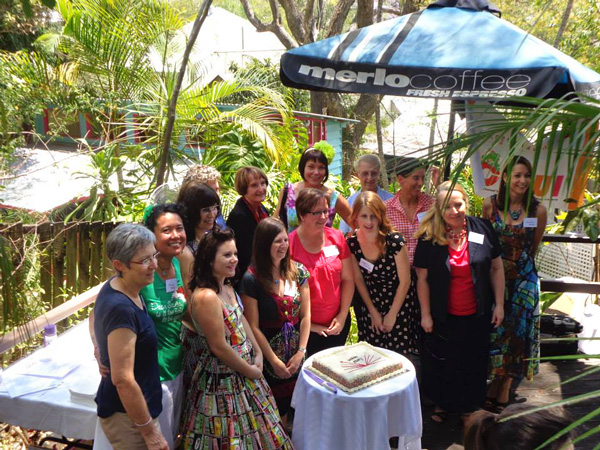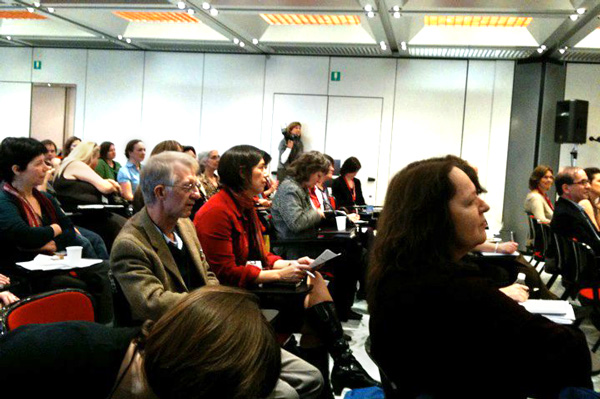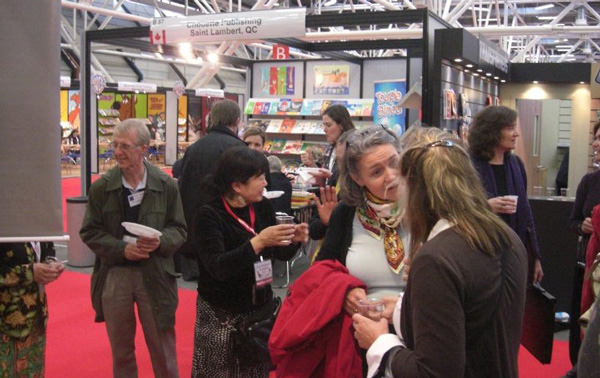Going to events that will be attended by publishing professionals, from free talks, book launches and celebrations…

…to conferences of any size, all can assist the publishing process journey if you are writing for children or adults.

‘All I ask is an honest advantage’
Learn. Be inspired.
Seek to be remembered
for the right reasons.
You will meet…
- Organisers (they may employ you in the future) and presenters.
- People like yourself with a positive outlook (make friends, share knowledge and help each other. You’ll become a ‘family force’ and inspire and encourage each other, and be a support when the going gets tough.)
- Creators who are multi-published/famous and higher up the ladder (they have knowledge and influential friends).
- Timid people who know no-one and have never been to an event before (make them feel welcome – they could become super famous or an editor, and remember you).
- Editors/agents/publicists (with whom you may like to work to have a book published ).
- Teachers/librarians (may buy your books and hire you to talk).
Get to know some of these people
I live in Australia where there are fewer literary agents than in the US, and most publishers are open to direct submission at some time during the year. In other countries, many publishers only accept submissions by a literary agent. However, it’s beneficial if you can become known throughout the industry as professional and ‘nice’. No matter what kind of event you attend, networking is recommended:
- Have something interesting to talk about when asked “What have you been up to/been writing?” Make sure you have a short and sweet ‘elevator pitch’ of your story, and also a longer version. You could talk about research you are doing for a work in progress; an event you’ve been to; something book-related that you’ve read or discovered, or a course you’re doing.
An elevator pitch is the essence of the book in about 3 sentences – what you could say if you meet the editor or agent of your dreams in an elevator and they will be getting out at the next floor. And it can even be done in one sentence, as a log-line: ‘Rocky’ – A boxer (hero) with a loser mentality (flaw) is offered the chance by the world champ (opponent) to fight for the title (life changing event) but, with the help of his lover (ally) he must learn to see himself as a winner before he can step into the ring (battle).
…but be prepared and able to expand on this with a longer version if the person is interested and asks for more. - Practice this elevator pitch while talking to other creators, but ask at the end of the conversation with an editor/agent, “Do you publish/represent this genre?” “…Would you be prepared to read and consider this story/May I send you this story?” “…May I give you my card?/Shall we exchange business cards?”
- Listen to people around you at events. Ask questions – people like to know you’re interested in them and to talk about themselves (but you’ll probably avoid people who ramble on and on, so don’t you ramble on, either).
- Don’t barge in or be pushy to ‘famous’ well-published creators or professionals and their tribe – they are probably tired of people wanting to get something out of them. Just try to come over as a natural and genuine person. …But you could offer to promote their work on your blog with a review, or perhaps as part of a blog tour. Become a helpful friend in any way you can think of, with no immediate ulterior motive or expectation…but just maybe they or one of their buddies could be helpful way down the track.
- Connecting meaningfully with one or two people for a significant amount of time is probably more useful that flitting around trying to network with everyone present at an event.
- Research presenters. If they work for a publisher, find out what they have recently published and if any of their books has won an award so that you can congratulate them…and their team. Or, latest sales, if it’s an agent. You will be recognised as someone who is professionally involved in the industry, and congratulating people you meet is always a good conversation starter.
- Get your writing skill known. Give ‘important industry people’ an opportunity to discover how well to write before you meet them or your manuscript hits their desk. Comment on LinkedIn forums of ‘Groups’ they belong to, write articles for online magazines, comment on reviews of their books.
- Make sure your profile is up to date and well written on every social networking site.
- Try to ask a sensible question that many people are likely to want answered. When at a presentation, start by standing up so that you can be seen and give your name. It will be more likely that you will be remembered by an industry professional if you later meet face to face, and by other attendees.
- Have EXCELLENT business cards printed…not flimsy, with a generic background the same as used by dozens of other people, streaky colours, perforated edges… A matt and plain white surface on the back is best for writing on (perhaps the title of your story) when you hand it to someone – thanks for that tip, Rebecca Sheraton! (Business cards are less frequently used these days, but still have value. A head shot could help someone remember a pleasant conversation.)
- People become well published if they are talented and nice and professional to work with. Demonstrate your talent by having your work appear in online magazines, reviews and newsletters (as in 7), but also have work appraised. The appraiser may not like your story or it may not be appropriate for them to publish or represent it for a number of reasons, but they will remember that you can write well. Be a good listener and make notes. Ask questions. What will you say if they ask at an appraisal “Do you have other finished stories?” or “What else would you like to know?”?
- You are at a ‘business meeting’ – dress and speak professionally. Be a professional and have a website/blog.
- Be someone who appears NICE – efficient and likely to respond promptly and comfortably make deadlines; someone who listens intently and is likely to understand what is required if asked to do something or consider making changes if a contract is offered at any time – not such a motor-mouth that it’s hard to get a word in, or someone likely to be demanding or shout down the phone, or phone every day to check on progress. Be someone who appears courteous and open to suggestions and likely to discuss these amiably.
- Be someone ‘normal’ and friendly and easy to talk to—not pushy, creepy, overly generous or a whacko. Do not follow editors or agents to the toilet in order to talk to them, talk to them when their door is closed, push anything under their door or grab their attention while washing hands… (Yes, these have happened …on several occasions!) Never give or send gifts. ((If you’re an illustrator, you could have a doodle on your clipboard. If an ‘important person’ sees it and mentions it, you could offer it to them …but not a major artwork that has taken a week.))
- Never mention imagined spin-off merchandise with a story.
- NEVER EVER try to give a manuscript to an agent or editor at an event – it’s incredibly unprofessional …you’ll be remembered for the wrong reason, and editors and agents talk socially to each other, even if their businesses compete. Ask if you may send it.
- Don’t talk about a story’s rejections. If a publisher reads or hears these, they’ll have pre-conceived negative feelings about it: “…It’s done the rounds and nobody likes it, so I probably won’t either”.
- DO NOT SAY…
- ‘This is my first novel’ – Typically, most first novels are not very good, so this can be a ‘turn-off’, making the person think, ‘This writer is not ready’, even if yours is really good. Don’t give them the chance to stereotype you.
- My story has been edited/proof-read – All work should have been edited and perfected prior to submission. You could say it’s been professionally edited and who by if they are known in the industry, eg worked for a big publisher.
- Copyright or copyrighted or © – It’s copyright as soon as it’s written or the file is saved.
- It is entitled BBBB – books are ‘titled’.
- It’s a fiction novel – all novels are fiction.
- My critique partners / family / grandchildren have enjoyed it.
- How long you took to write it, or how many drafts you did – no one cares. You are expected to revise until it’s perfect, however long that takes.
- I am willing to appear/look forward to appearing on XXXX show.
- I look forward to a book tour.
- It will make a good movie.
- God or aliens made me write it.
- Thank people after an event – even if you didn’t meet them.
“Many thanks for all your organisation of the YYY event – it was most useful.”
“Many thanks for coming to the YYY event and all the insider info that you shared.”
Or if you did meet:
“I really appreciate the time you spent talking to me at YYY and the ‘top tips’ you gave us all. The place I was telling you about over lunch is called Snapper Rocks. I’ve enclosed a photo. I hope our paths cross again.”
Comment on their Facebook page. If you share a common interest, once or twice a year (not every week!), send a postcard of a surfing spot you’ve enjoyed if you are both surfers, and say “You’d like it here!”. Keep in touch…gently. If you meet at another event, they may introduce you to one of their own friends in the industry, or you may produce something more suited to their requirements in months or years down the track.
- Mention your connection in a cover or query letter for your story, whether or not you have had your work appraised by an editor or agent, or talked to them:
Dear Ms Person,
Thank you for your most useful talk at the September YYY Festival, especially your tip for KKKK
ZZZZ is a 400 word picture book story for children aged 3-5…
or
Dear Ms Person,
Thank you for your most useful talk at the YYY Conference in May and answering my question about word counts. It was wonderful to meet and chat socially over lunch.
ZZZZ is a 400 word picture book story for children aged 3-5…
Feel free to provide a link to this article or include it on a website with attribution…hopefully with a brief bio:
 Peter Taylor lives in Australia. Since 1987, he has had fun fiction and how-to non-fiction books for children and adults published across the world. His picture book, ‘Once a Creepy Crocodile’ illustrated by Nina Rycroft and pub. The Five Mile Press was shortlisted for the 2015 Book of the Year award by Speech Pathology Australia. Peter is also an internationally respected calligrapher and artist’s book constructor, and has been Newsletter Editor for the Children’s Book Council of Australia and Co-ordinator of SCBWI Queensland. He delights in sharing his extensive historical book and document collection and encouraging children and adults to love books, read, write and be creative. Peter offers workshops, talks and performances to libraries, schools and festivals. www.writing-for-children.com
Peter Taylor lives in Australia. Since 1987, he has had fun fiction and how-to non-fiction books for children and adults published across the world. His picture book, ‘Once a Creepy Crocodile’ illustrated by Nina Rycroft and pub. The Five Mile Press was shortlisted for the 2015 Book of the Year award by Speech Pathology Australia. Peter is also an internationally respected calligrapher and artist’s book constructor, and has been Newsletter Editor for the Children’s Book Council of Australia and Co-ordinator of SCBWI Queensland. He delights in sharing his extensive historical book and document collection and encouraging children and adults to love books, read, write and be creative. Peter offers workshops, talks and performances to libraries, schools and festivals. www.writing-for-children.com

